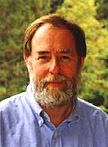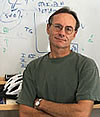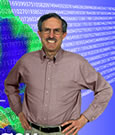 |
| |
| Today
8
a.m.
EHS 432
Radiation Protection
Bldg. 51-201
1
p.m.
Scientific Computing
Architecture Independent Performance Characterization and Benchmarking
Erich Strohmaier
Bldg. 50A-5132
2
p.m.
EHS 339
Asbestos Awareness
Bldg. 51-201
4
p.m.
College of Chemistry
Spin Dependent Transport in Magnetic Oxide Junctions
120 Latimer Hall
Monday
8 a.m.
EHS 206
Crane Training
Bldg. 51-201
9 a.m.
Computing Information Systems
Windows XP: Level One
51L Training Facility
4 p.m.
College of Chemistry
Signaling by PDA: Dynamics of Catalysis and Localization
Susan Taylor, UCSD
100 Lewis Hall
Mechanical Engineering Dept.
Some Fundamental Problems in Dislocation Dynamics
Xanthippi Markenscoff, UCSD
3110 Etcheverry Hall
4:30 p.m.
Physics Dept.
An Enhanced Cosmic-Ray Flux in Diffuse Interstellar Clouds,
Inferred From Laboratory measurement of H#+ Recombination
Benjamin McCall
1 LeConte Hall
|
|
| |
 |
 |
| |
Market Carvery: Southwestern Chicken
Casserole
Fresh Grille: Fried Catfish with
a Blackened Tomato & Corn Sauce
Menutainment: Viva La Burrito! Chicken
or Pork
Origins: Sushi
Dinner: TBA
|
|
B'fast: |
6:30
a.m. - 9:30 a.m. |
| Lunch: |
11
a.m. - 1:30 p.m. |
| Dinner: |
5
- 7 p.m. |
Full
Menu
|
|
|
|
 |
|
Fleming
Visits FSU as
Distinguished Visitor
|
|
 |
|
|
|
Fleming
|
|
|
|
Physical
Biosciences Division Director Graham Fleming
visited Florida State University last week as part of
the Phi Beta Kappa Visiting Scholar Program, which gives
students and faculty the chance to learn from some of
science’s leading authorities. Professor Fleming
shared his work on electron transfer in photosynthesis,
and specifically discussed how plants optimize their
photosynthetic processes during the course of a day
in response to brighter and dimmer sunlight. While there,
the FSU radio program Headlines interviewed Fleming.
Go here
to listen to the broadcast (Real Audio required).

|
|
 |
| Genome
Deserts
Yield DNA Gold
|
|
 |
|
|
|
Rubin
|
|
|
|
 |
|
|
|
Vast
regions of the human genome thought to be genetic “deserts”
harboring DNA sequences of no value may actually contain
heretofore hidden nuggets of DNA gold. Berkeley Lab’s
Eddy Rubin and a team of researchers
compared DNA sequences from gene deserts in humans,
mice, frogs and fish, and discovered that DNA sequences
can regulate the "expression" of genes over
surprisingly long distances. Read the full story in
this week’s issue of The View.
Go here
to read the report in today’s issue of Science
Magazine.

|
|
|
|
 |
|
|
|
|
|
|
 |
|
|
|
Gold |
|
|
|
|
|
|
|
These
Chinese 'Cures' Can Cause Cancer
Herbal
products such as “Mother Earth’s Cough
Syrup” and “PMS-Ease” are sold over
the Internet as “natural” medicine even
though they contain a cancer-causing agent that was
banned for import by the FDA two years ago. Berkeley
Lab scientist Lois Gold, director
of the Carcinogenic Potency Project at UC Berkeley,
co-authored a letter in this week’s New England
Journal of Medicine warning about more than 100 products
that contain aristolochic acid, a known carcinogen
that’s used in traditional Chinese medicine.
Gold’s NEJM letter can be read here.

Scientist
Shows Power
Of 'Experimental Math'
By
Lysander Jim
|
|
 |
|
|
|
Bailey |
|
|
|
If
you want to make a mathematician scoff, tell him that
you will make an original discovery about pi. The
presumption, of course, is that you'll catch something
that over 2,000 years of mathematics has not. This
skepticism explains the astonishment of the mathematical
community at a discovery in 1996. That year, David
Bailey, now chief technologist for the National
Energy Research Computing Center at Lawrence Berkeley
National Laboratory and two collaborators published
their findings—a new formula for expressing
pi as an infinite series. Full
story.

|
|
|

Los
Alamos Researchers
Envision Space 'Elevator'
Researchers
are proposing an elevator reaching 62,000 miles
into the sky that would be able to launch payloads
into space at a far lower cost than the space
shuttle. The Los Alamos National Laboratory scientists
are so convinced it can be a reality that they
are working on their own time on technical details.
Five to 10 scientists at any given time are analyzing
the economics and technical specifications of
how the elevator would work and possible health
risks to those using it. Full
story.

|
|
|
 |
| 
|
 |
|
UCOP Proposing New and Revised Policies
The
University of California is proposing a new policy
on Conflicts of Interest Created by Consensual
Relationships and a revised policy on Sexual Harassment
and Procedures for Responding to Reports of Sexual
Harassment. If adopted, the policies would cover
all members of the University community, including
Laboratory employees. Click here
to view the proposed policies.
|
|
|
|
 |
| |
|

